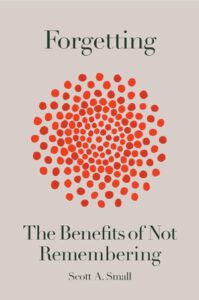Forget it – It does you good!
We all want to have a good memory. We regard not remembering something as a failure. A mistake! Forgetting is actually an important ability of our brain that we absolutely need for a successful, happy life.
 Misplaced your keys, forgotten what you’re doing, can’t remember the name of your new neighbour? We all know them, those unpleasant moments of forgetfulness when our brain seems to fail. Surprisingly, science has a different view of forgetting: It is said to be a vital survival mechanism and not a deficit. How can that be?
Misplaced your keys, forgotten what you’re doing, can’t remember the name of your new neighbour? We all know them, those unpleasant moments of forgetfulness when our brain seems to fail. Surprisingly, science has a different view of forgetting: It is said to be a vital survival mechanism and not a deficit. How can that be?
The American neuroscientist Scott A. Small has been researching for decades why our memory fails us. As head of the Alzheimer’s Research Center at Columbia University in the USA, he dedicates his work primarily to people who suffer from forms of pathological forgetting. And yes, you can’t sugarcoat it. It is sad. It causes massive suffering for those affected and their families. But Small’s research also revealed that “normal” forgetting, as we all experience it, is not a failure of the mind. On the contrary: this process helps us to adapt flexibly to life’s challenges. The brain even has special tools specifically for forgetting, a “molecular tool box”, which actively ensures that memories fade. You can imagine forgetting like a sculptor’s chisel creating a marble sculpture. With each chiseling away (forgetting), new insights are sculpted in the brain.
Also important to know: Normal forgetting is innate to us humans. It varies as much from person to person as body size. Just as there are people who are taller or shorter than average, some are true memory artists and others forget rather quickly.
Why forgetting should be a good thing becomes clearer when we realize that our memory is not a hard drive. Nor is it a library in which facts are documented and neatly sorted. Memories are not books that we pull off the shelf. They are constantly being created and are constantly changing. Memory is a reconstruction and interpretation machine that runs around the clock. Memories are constantly adapted to new insights and experiences. Other nuances and emphases come to the fore – and some things fall away.
Scott A. Small’s book “Forgetting: The Benefits of Not Remembering” Publisher Crown (13 July 2021)
Neuroscientist Small uses a comparison to illustrate why we should forget – indeed, why we have to forget in order to live well: In 2010, the European Court of Justice decided on the right to be forgotten. There must be a kind of “digital eraser* to protect people. After all, digital information that is stored permanently can have a detrimental effect on the lives of those affected. It’s the same with our brain: it needs a good balance of remembering and forgetting in order to function well. People in whom the normal process of forgetting is disturbed suffer from autism or post-traumatic stress disorder, for example. People with certain forms of autism are unable to block out and forget details. It is therefore much more difficult for them to generalize; for them there are many different branches and twigs, but no forest. Every little change, every new perspective floods them with too much new information. People suffering from post-traumatic stress disorder, on the other hand, are unable to forget emotionally. The inner images of the horror do not fade like an old photograph. Even years later, the horror can be as present as if it had just happened. The saying “Time heals all wounds” only applies to those who are blessed with a healthy forgetfulness.